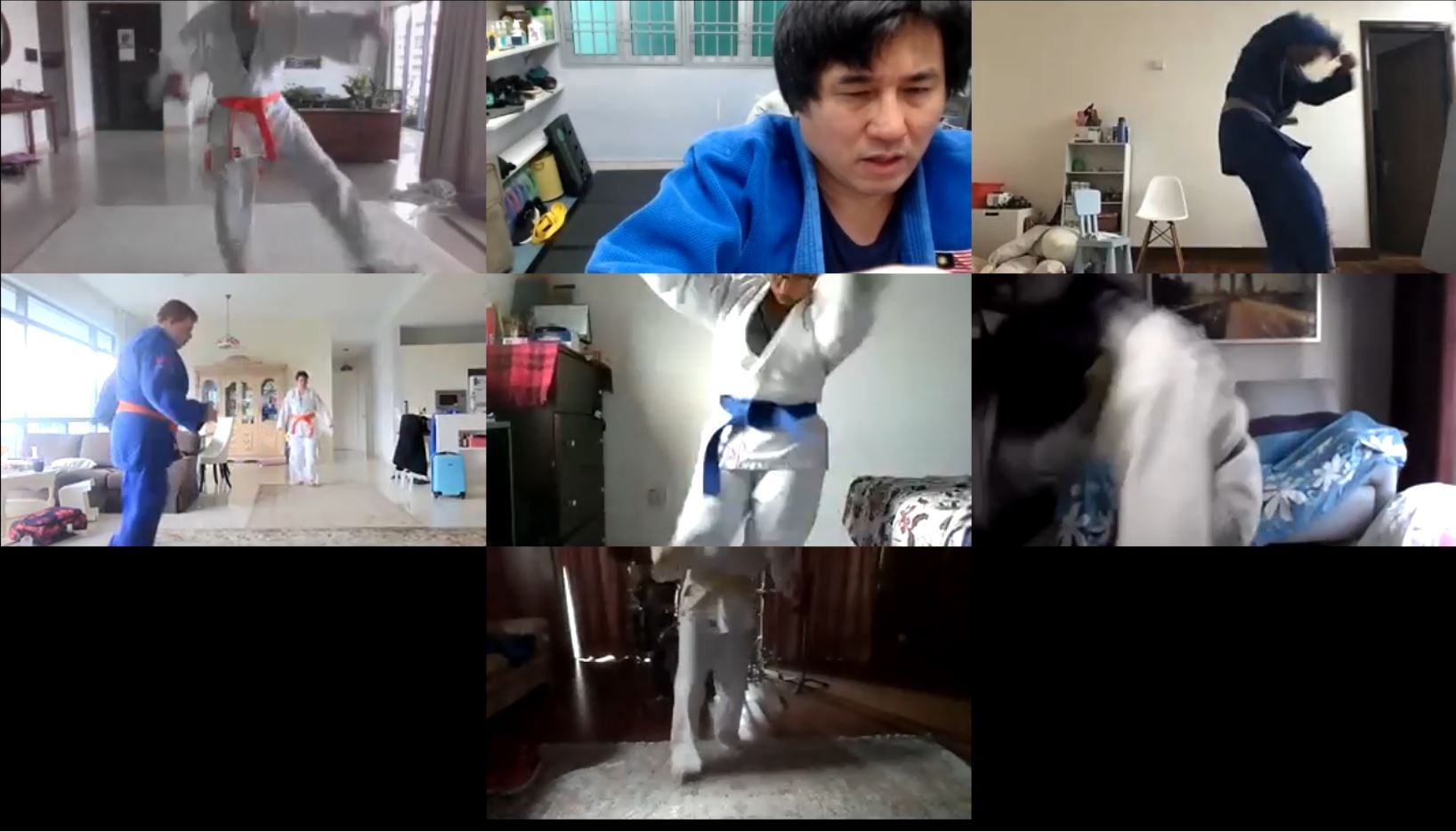
Sometimes, after a judo class you feel damn good because the session had turned out really well. Other times, things don't go as well as you'd like, and you feel kind of frustrated.
When we were doing socially-distanced training in the dojo, most of the time the sessions went remarkably well. Although we weren't allowed to do any contact training the fact that we were there in person makes it surprisingly easy to teach techniques (with the aide of sticks, cones and teddy bears).
It's much harder when you are not allowed to train together and have to do it via Zoom. For one thing, the webcam doesn't really take a wide shot so you constantly have to move the camera around, to focus on the body part that you are emphasizing. If I'm showing them footwork, I have to move the camera downwards so they can see my legs. When I want to teach hand movement, I have to adjust it upwards. There's a need to constantly move the camera.
It's also much harder to monitor the player's performance because the video sometimes lags or is blurry.
Normally, I'm a positive and optimistic guy. I like to view the glass as half full rather than half empty. And 99% of the time, I'm thankful that we have Zoom. Imagine if we were in a lockdown with no means to train online with each other. How miserable all of us would be.
So, I'm truly glad we have Zoom. In fact, I've paid for a pro account. That allows me to conduct sessions beyond the 40 mins that a free account get. And we use this facility for up to nine sessions as week (yellow belt, orange belt, green belt, blue belt, brown/black belt, fitness training, competition judo, recreational judo and kids class).
But there was one session recently where I tried to teach more advanced techniques and the limitations of teaching judo remotely really hit me like a hammer. I think the players didn't feel it was a bad session but I certainly felt it was, and it bummed me out for a while.
After I had time to sit down and think about it, I realized that there's actually a lot of good that has came out of the lockdown. For one thing, it's allowed all our injuries to heal. Judo is a tough sport and practically all our players had some injury or another on their toes, ankles, fingers, wrists, backs, etc. I, myself, had a badly stubbed toe that probably involved a hairline fracture. It's okay now.
More importantly, it has forced all of us to be more focused in our training. When there's no lockdown, there are distractions all around. People have social lives and they sometimes have to attend some social events like dinners, parties and family vacations, etc. With the lockdown, people can't go anywhere. So they focus on judo instead.
Even on the mat, there is way more focus during the lockdown. When you are able to do regular judo, you naturally want to do more randori. You don't want spend hours and hours doing repetitive drills, although that's good for you. You want to play judo and that means doing randori. But during lockdown, all you've got are drills. As a result, your technical development actually improves.
Our first lockdown happened towards the end of March last year. So, it's been about 11 months now of doing mainly solo training. My teaching has evolved quite a lot during this time.
At first, nobody assumed the pandemic would last for as long as it has. We thought it might be over within a few months. So, the stuff I had the players do was mostly exercise-related rather than skills-related. The idea was to give them a good workout.
When it became obvious that we are gonna be stuck doing solo judo for a long time to come, my approach to teaching changed. I decided I'm going to teach them technical stuff despite the limitations. With that in mind, I proceeded to do a lot of research online. I borrowed the good ideas I found and modified them a bit to make them more relevant to what I was trying to teach.
For a while, all we did was tachi-waza stuff because it's easy enough to have them do shadow uchikomi and also use sticks and cones that mimic uke's target leg and target foot. When I decided to start teaching newaza, at first I asked them to bring pillows. That was good enough for doing hold-downs. But when we started getting into strangles, armlocks and sankakus, they really needed a dummy with arms, legs and a head. Since grappling dummies are not so easy to find and they are expensive to order online, I asked them to get giant teddy bears. With a teddy bear, it's suddenly possible to have them do almost any judo newaza.
Now, as we head towards our second year of training under some form of lockdown, I'm teaching them pretty advanced stuff, both in newaza and tachi-waza. Of course it's not the same thing as doing real judo and when we can go back into the dojo again, they will have to get the feel of doing real uchikomi, real nagekomi and real randori with a real partner in order to properly master their new skills.
But I'm very sure they will be able to pick up all the techniques very quickly. That's because they already know all the necessary moves involved for those techniques. They just have to get used to real-world applications, that's all. That will come with the resumption of contact judo.
When I look back at all the ways I've taught them technique, using whatever tools we had at our disposal – sticks, cones, judogis, belts, teddy bears and even imaginary partners – I'm really proud of what we have achieved. To my credit, I've come up with a lot of innovative ways to teach them the fundamental principles behind each throw or ground move. To their credit, they've worked really hard and diligently, doing drills repeatedly until muscle memory has started to kick in. Together, we've made real substantial progress.
If there had been no lockdown, I would not have been forced to think so much, so hard, and in such an out-of-the-box manner, about ways to teach judo. But I've had to do it for almost a year now and I'm a better coach for it. It's really strange how a simple twist of fate has impacted my coaching approach and style so much. There's no question in my mind that I will come out of this lockdown a far superior coach than I was going into it. Behind every dark cloud there is a silver lining.
